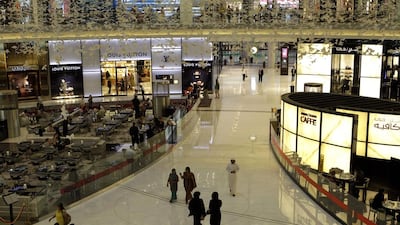The UAE stock market regulator has reversed its opposition to greenfield IPOs and provided exemptions in a bid to win back any local companies considering a listing abroad, analysts and investors say.
Until this year, the UAE Securities and Commodities Authority's (SCA) regulatory framework for initial public offerings was quite restrictive and even dissuaded some companies from looking to raise cash from local equity markets.
“You have to raise 55 per cent and companies end up with a massive capital base that is exaggerated,” said Majd Maaiteh, the head of securities at National Bank of Abu Dhabi. “For founder shareholders, there’s no option to exit or cash out.”
A greenfield IPO is the process of raising cash to list a company that is neither in operation nor has a track record, as a shell or holding firm to then acquire existing businesses.
The Dubai retailer Marka this month became the UAE’s first such IPO, raising as much as Dh10.35 billion, as investors rushed to buy into a holding company that would acquire businesses in a lucrative industry with no representation on the equity markets.
The success of Marka's greenfield share sale encouraged the SCA to consider more potential offerings, such as the facilities management holding company in which the Drake & Scull chief executive Khaldoun Tabari is a founding shareholder.
“It says a lot about our markets where investors are more interested about who is behind the business rather the business itself,” said Fathi Ben Grira, the chief executive at Mena Corp, an Abu Dhabi investment company. “That’s why it’s relatively easy for successful promoters with a proven track record of achievements to launch a greenfield: these promoters know that investors are investing in their names first.”
This week SCA allowed heavyweight Emaar Properties to float 25 per cent of its retail and malls unit on the Dubai Financial Market instead of the mandatory 55 per cent. The exemption became the decisive factor for the developer to consider Dubai over a potential London listing in its aim to raise Dh8 billion to Dh9bn from investors.
“The only interesting question to come out of this is will they duplicate the exemption they did with Emaar with other companies who are looking to go to the market?” said Sebastien Henin, the head of asset management at The National Investor, a boutique Abu Dhabi-based investment bank.
Although the legal framework of the Companies Law allows greenfield IPOs, until now the SCA had been strongly opposed to the practice and in 2005 issued a blocking resolution.
Concerns over the potential souring of the business following the IPO, reputational damage and investor rights have prevented the regulator from supporting greenfield IPOs until now.
“They wanted to protect the secondary market. There were a lot of files of companies that wanted to go public, but they wanted to make sure only good companies will pass,” NBAD’s Mr Maaiteh said.
But a flurry of UAE corporate listings in London in the past two years prompted the regulator to reassess its policy to maintain liquidity on the local markets. The regulator declined to comment when contacted by The National.
In January 2012, Abu Dhabi Capital Management opted for London's Alternative Investment Market over the Abu Dhabi Securities Exchange, citing lack of liquidity and numerous hurdles for the local bourses in attracting business.
In April 2012, NMC Health raised $187 million in London, becoming the first Abu Dhabi-based firm to list on the premium segment of the London Stock Exchange.
In 2013, Al Noor Hospitals followed suit, raising as much as $342m from investors. Also last year, the Dubai property developer Damac raised $400m by issuing global depositary receipts (GDRs) in one of the largest international IPOs in London in 2013.
“Now things are different, the market has developed and people and corporates are looking at opportunities and alternatives outside the country,” Mr Maaiteh said.
halsayegh@thenational.ae

